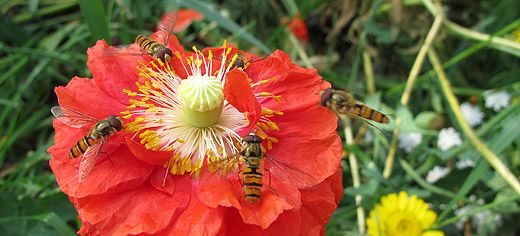
A three year £1.3 million research project will examine how bees, hoverflies and other pollinating insects are affected by city life.
More than 100 parks, gardens, allotments, cemeteries and other natural and man-made habitats across Leeds will be studied by scientists from the University of Leeds this spring.
Over the next few months, teams of ecologists will be sampling plants, pollinators and their interactions in gardens across four UK cities, including Leeds. They will also be creating large flower meadows in 15 sites in public parks and school grounds in each city. These flower-rich meadows will provide pollen and nectar for pollinating insects and act as 'wildlife corridors', allowing insects and other invertebrates to thrive.
Urban areas now comprise 9 per cent of land in the UK so it is important to know how pollinators are affected by city life. This fieldwork will provide data on where pollinators can be found in the UK and shed light on the complex network of interactions between plants and their pollinators. The information collected will ultimately help local authorities to bring about more effective conservation management of these important insects. Professor Bill Kunin of Leeds' Faculty of Biological Sciences who is coordinating the project in Leeds, said: "Cities - and gardens in particular - can support surprisingly rich pollinator communities.
By providing a wide range of flowers that last from early spring to late summer householders can make a real difference to the conservation of bees and other pollinating insects that are a vital part of the natural ecosystem." The research will be carried out in four UK cities: Bristol, Reading, Leeds and Edinburgh. It is funded jointly by a grant from the BBSRC (Biotechnology and Biological Sciences Research Council), Defra, NERC (Natural Environment Research Council), the Scottish Government and Wellcome Trust under the Insect Pollinators Initiative. Photos are available, please contact Campus PR.
For further information:
Please contact the University of Leeds Press Office on +44 (0)113 343 4031 or email pressoffice@leeds.ac.uk
Notes to editors
The project, Urban pollinators: their ecology and conservation, runs until July 2014. Further information can be found on the project website: http://www.urbanpollinators.org/ The project is a collaborative study between the University of Bristol, University of Edinburgh, University of Leeds and University of Reading.
The Faculty of Biological Sciences at the University of Leeds is one of the largest in the UK, with over 110 academic staff and over 400 postdoctoral fellows and postgraduate students. The Faculty is ranked 4th in the UK (Nature Journal, 457 (2009) doi:10.1038/457013a) based on results of the 2008 Research Assessment Exercise (RAE). The RAE feedback noted that "virtually all outputs were assessed as being recognized internationally, with many (60%) being internationally excellent or world-leading" in quality. The Faculty's research grant portfolio totals some £53M and funders include charities, research councils, the European Union and industry. http://www.fbs.leeds.ac.uk/